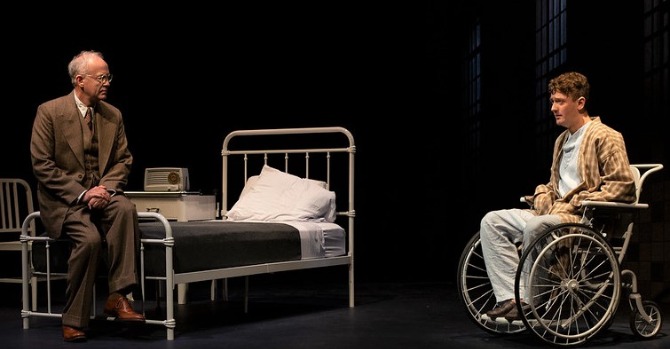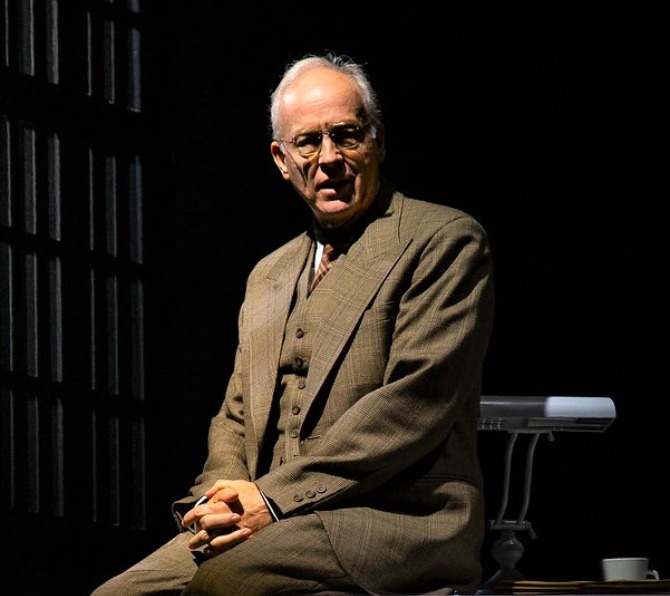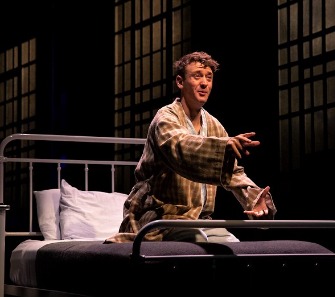Barrington Stage Company
Chester Bailey
by Joseph Dougherty.
Directed by Ron Lagomarsino. Reviewed by J. Peter Bergman.
"And as I’m trying not to break into a dead run I keep asking myself: Where are the righteous lightning bolts? "
This is a time when we're all trying to adjust to the times we live in. Some of us are immediately successful; some of us seem reluctant to detach from the awkward and difficult life we've lived for the past year and a half. Others emerge from the living coma we've known as though there has never been anything else. We are the two principles of this fine play by Joseph Dougherty. We are their much spoken of relatives and associates of these two men at the center of the play "Chester Bailey." Barrington Stage Company has found the perfect vehicle to usher us into the world again, using an entertainment contained within four walls, walls of permanence and not temporary structures like tents, that speaks to the hard maladjustments that have imprisoned us for so long.

Reed Birney as Dr. Cotton; Ephraim Birney as Chester Bailey; Photo: David Dashiell
Chester Bailey is a young man who has not fought in the war (WWII) but who nevertheless has suffered the consequences of war. Protected through the machinations of his mother from enlisted service, he is wounded by a fellow-worker in the factory where they work at the Brooklyn Navy Yard. Torn apart by a vicious attack he had been blinded, lost an ear and both his hands. Hospitalized, his accidental wounding destroys his family, his few friendships and his future. He is a man who survives through self-protective self-imaging, living through a self-confidence dependent on total disbelief. He lives this lie in the Walt Whitman Hospital, a mental facility on Long Island.
Eventually his new primary doctor becomes Dr. Cotton, a man whose own personal history is also based in his understanding that nothing in his life is as he perceived it. The two men play out a crazy duet of monologues and dialogues that keep them at arms distance and seemingly unable to help one another recover into a world of reality. They have a long distance to cover on their way back to honest sanity and that journey is where the play lays it course.
Chester and his doctor are on parallel tracks that occasionally meet, pass over each other, and part again. Each of them deals with betrayal, with trust and faith, with gigantic losses and with dishonest and selfish awareness. Believing in his sight and his lost hands, Chester ventures toward a future that cannot be achieved while Philip Cotton emerges from a marriage in disarray only to enter into a tortured affair with his boss's wife, an affair that can only bring him more ruination. Neither man can truly help the other; they cannot even help themselves.

Reed Birney; Photo: David Dashiell.
Reed Birney plays Dr. Cotton with utter simplicity, never allowing the emotions of the Doctor's situation to get in the way of his expressing a clinical assessment of the tragic circumstances through which he is living. As Cotton becomes more involved with the process of contending with Chester's inability to understand his situation he self-alienates more and more from the real difficulties in his own live. The writing by Dougherty gives him the means of doing this, but it is Birney who keeps things cool between the people he betrays, including his patient. Director Ron Lagomarsino helps him distance himself physically, but Birney uses his character's words to create a clinical distance. Even as emotions run hot Birney's doctor uses language to protect himself and his patient. When he reverses this to force a realization on Chester, the actor still delivers his lines from a distance that seems remarkable under the circumstances. When the production's reality pushes this difficulty further (the actor is the father of the actor playing Chester) he turns into the isolated man Dr. Cotton really is. It takes the curtain call to show us that he is a man of great personal emotion and a consummate actor.
Ephraim Birney looks nothing like his father; nor does he sound like him. As his poignant Chester draws closer to his doctor, there is a sudden remarkable similarity between the two men in the play. Neither character is at all like the other, but for a moment or two, as their stories tense and disturb each other, there comes a poignant second when they become each other. The incident is more Chester's but it has its peculiar resonance in Dr. Cotton. Chester's reality has altered and we feel it through the doctor's reaction to it. This is as good as theater can get and the actors, playwright and director allow us to witness and partake in it; it is suddenly a Thanksgiving feast of emotions and we silently give thanks for having been allowed to experience it. We come out of our tired depression into what live theater does best: open us to the greatness of the world we live in. . .again.
The set designed by Beowulf Boritt is the perfect setting with ceiling fixtures and massive windows. Brendan Aanes's sound design - from radio music to rain - is emotive and right. Peter Kaczorowski's lighting design is busy and beautiful in its combination of stark reality and internalized narrative. Toni-Leslie James' costumes are just plain perfect. Lagomarsino has used these talents to shape a world of very real unreality. He has done very well by this play and its performers. Barrington Stage welcomes us back from our isolation into the isolated world of Chester Bailey. I hope they realize how grateful we all must be for the challenge.
+ 06/24/2021 +

Ephraim Birney; photo: David Dashiell
Chester Bailey plays on the Boyd-Quinson Stage at Barrington Stage Company, 30 Union Street, Pittsfield,MA through July 3. For information and tickets go to their website at www.barringtonstageco.org or call 413-236-8888.